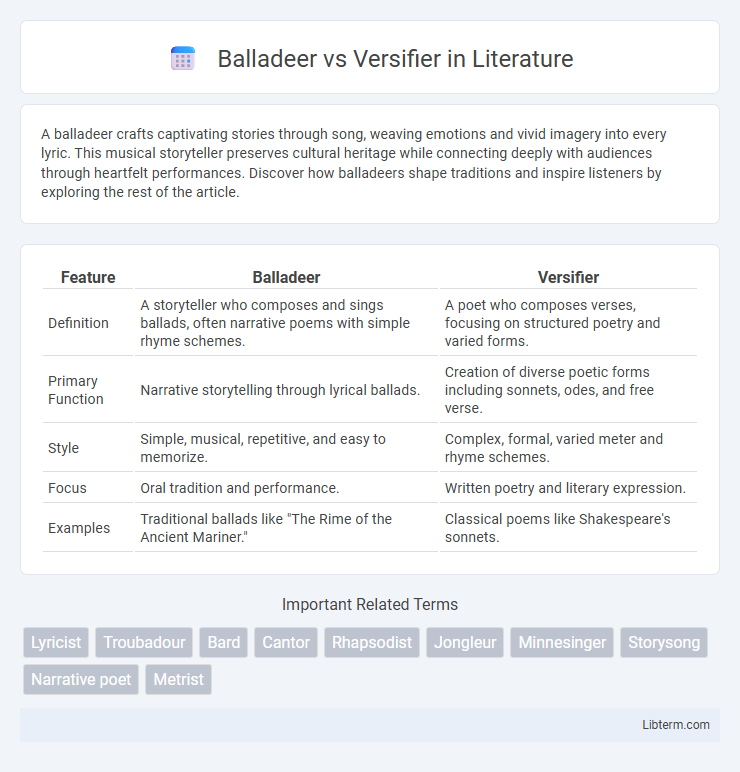A balladeer crafts captivating stories through song, weaving emotions and vivid imagery into every lyric. This musical storyteller preserves cultural heritage while connecting deeply with audiences through heartfelt performances. Discover how balladeers shape traditions and inspire listeners by exploring the rest of the article.
Table of Comparison
| Feature | Balladeer | Versifier |
|---|---|---|
| Definition | A storyteller who composes and sings ballads, often narrative poems with simple rhyme schemes. | A poet who composes verses, focusing on structured poetry and varied forms. |
| Primary Function | Narrative storytelling through lyrical ballads. | Creation of diverse poetic forms including sonnets, odes, and free verse. |
| Style | Simple, musical, repetitive, and easy to memorize. | Complex, formal, varied meter and rhyme schemes. |
| Focus | Oral tradition and performance. | Written poetry and literary expression. |
| Examples | Traditional ballads like "The Rime of the Ancient Mariner." | Classical poems like Shakespeare's sonnets. |
Understanding the Terms: Balladeer and Versifier
A balladeer is a singer or poet who composes and performs ballads, which are narrative songs or poems often recounting stories of love, adventure, or historical events. A versifier, on the other hand, is someone who skillfully writes verses or poetry, focusing on form and meter rather than storytelling alone. Understanding these terms highlights that a balladeer combines musical storytelling with poetic elements, whereas a versifier emphasizes the craft of poetry creation without necessarily incorporating music or narrative.
Origins and Historical Context
The balladeer traces its origins to medieval Europe, where ballads emerged as narrative songs popular among common folk for storytelling and preserving oral history. In contrast, the versifier has roots in classical poetry traditions, emphasizing structured verse and formal meter to craft lyrical or epic compositions. Understanding these distinctions highlights the balladeer's role in folk culture and the versifier's place within literary and scholarly contexts.
Distinctive Roles in Poetry and Music
Balladeers primarily perform narrative songs that tell stories, often emphasizing emotional expression and melody within folk or traditional music contexts. Versifiers focus on crafting structured poetry, emphasizing meter, rhyme, and formal literary techniques to create written or spoken verses. The distinctive roles highlight balladeers' connection to oral storytelling and musical performance, while versifiers contribute to literary culture through the disciplined art of poetic composition.
Stylistic Differences in Composition
Balladeers emphasize narrative storytelling with a rhythmic and melodic structure, often using quatrains and a consistent rhyme scheme to evoke emotion and drama. Versifiers prioritize adherence to traditional poetic forms, focusing on meter, rhyme, and linguistic precision to craft more formal and structured verses. While balladeers aim for oral performance appeal, versifiers cater to literary aesthetics and intellectual depth in their compositions.
Themes and Subject Matter Explored
Balladeers often explore themes of love, heroism, and tragedy through narrative storytelling that conveys emotional depth and cultural traditions. Versifiers tend to focus on diverse subject matters, including philosophical reflections, social commentary, and experimental poetic forms, emphasizing technical skill and creative expression. The thematic scope of balladeers is generally rooted in folklore and communal experiences, while versifiers engage with broader intellectual and artistic topics.
Performance and Presentation Styles
Balladeers prioritize storytelling through melodic, narrative-driven songs, delivering performances that emphasize emotional connection and lyrical clarity, often accompanied by minimalistic instrumentation. Versifiers focus on rhythmic precision and poetic structure, showcasing verbal dexterity and intricate rhyme schemes, typically in spoken word or rap formats that highlight linguistic artistry. Performance styles of balladeers tend to be more melodic and lyrical, while versifiers engage audiences with dynamic recitation and rhythmic emphasis.
Audience and Cultural Impact
Balladeers typically engage audiences through narrative-driven songs that evoke shared cultural memories and community identity, often preserving folk traditions and historical events. Versifiers appeal to literary and poetic communities by crafting structured, stylistic verses that challenge linguistic norms and explore complex themes, thereby influencing contemporary poetry and literary discourse. The cultural impact of balladeers lies in their role as oral historians and storytellers, while versifiers contribute to the evolution of poetic form and intellectual reflection.
Notable Examples Throughout History
Balladeers like Woody Guthrie and Bob Dylan have historically used narrative songs to tell stories and capture cultural moments, while versifiers such as Alexander Pope and Samuel Taylor Coleridge crafted structured poetic verses emphasizing rhythm and meter. The balladeer's influence spans folk music traditions, often blending oral storytelling with melodies, whereas versifiers shaped literary movements through formal poetry. Notable examples highlight the balladeer's role in preserving societal tales and the versifier's contribution to evolving poetic expression.
Modern Relevance and Evolution
Balladeers, traditionally known for storytelling through lyrical narratives, have evolved by incorporating contemporary themes and multimedia platforms, maintaining cultural relevance in music and performance arts. Versifiers, once confined to structured poetic forms, now embrace digital expression and experimental styles, broadening their influence in literature and online content creation. Modern relevance of both roles lies in their adaptive use of technology and diverse genres to engage global audiences.
Choosing Between Balladeer and Versifier
Choosing between Balladeer and Versifier depends on your specific creative needs and writing style. Balladeer excels in generating narrative-driven poetry with a focus on rhythm and storytelling, making it ideal for those seeking lyrical and emotive verses. Versifier offers more flexibility in structure and theme, suitable for writers prioritizing varied poetic forms and precise wordplay.
Balladeer Infographic

 libterm.com
libterm.com